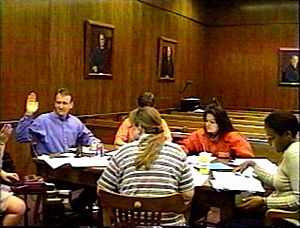Deposition (law) facts for kids
A deposition is when someone gives sworn testimony (answers questions under oath) outside of a courtroom. It's like an interview where everything said is recorded. This happens in lawsuits in countries like the United States and Canada. Lawyers use depositions to gather information before a trial. No judge is usually present during a deposition; it's just the lawyers, the person answering questions, and a court reporter.
Contents
What is a Deposition?
A deposition is a formal meeting where a person, called the deponent, answers questions under oath. This means they promise to tell the truth, just like in a courtroom. The questions are usually asked by lawyers involved in a legal case. Everything said during a deposition is written down by a special person called a court reporter. Sometimes, the deposition is also recorded on audio or video.
Why are Depositions Important?
Depositions are a key part of gathering information for a lawsuit. They help everyone involved understand the facts of the case better. Here's why they are important:
- Getting Information: Lawyers learn what witnesses know and what they might say if the case goes to trial.
- Preventing Surprises: Depositions help avoid unexpected information appearing during a trial. Everyone gets a chance to see the evidence beforehand.
- Saving Memories: They record a witness's story while it's still fresh in their mind. This is helpful because trials can happen months or even years later.
- Checking for Truth: If a witness says something different in court than they did in their deposition, lawyers can use the deposition to show the difference. This helps check if the witness is being consistent.
- Using Testimony Later: If a witness can't come to the trial (for example, if they are sick or live far away), their deposition can be used instead. It's like their testimony is still heard by the jury.
- Helping Settle Cases: After depositions, everyone might have enough information to guess how a trial would end. This can help them agree to a settlement and avoid a long, expensive trial.
How Depositions Work in the United States
In the United States, depositions are a common part of civil lawsuits (cases between people or organizations, not criminal cases). Rules for depositions are set by federal or state laws.
Who is Involved?
- The Deponent: This is the person who answers the questions. They are under oath.
- Lawyers: Lawyers for all sides of the case are usually present. One lawyer asks the questions, and others might object to certain questions.
- Court Reporter: This person writes down every word said during the deposition. They create an official written record called a transcript. Sometimes, they also make audio or video recordings.
How Does a Deposition Start?
If the person being questioned is one of the main parties in the lawsuit, their lawyer usually gets a legal notice. If the person is not a main party (a "third party") or doesn't want to testify, they might receive a subpoena. A subpoena is a legal order that requires them to appear and answer questions.
Where Do Depositions Happen?
Depositions usually take place outside of a courtroom. They might happen in a lawyer's office, a conference room, or a special office for court reporters.
What Happens After a Deposition?
The court reporter creates a written transcript of the deposition. This transcript can then be used by lawyers to prepare for trial, to support motions (requests to the court), or to challenge a witness's statements later on.


